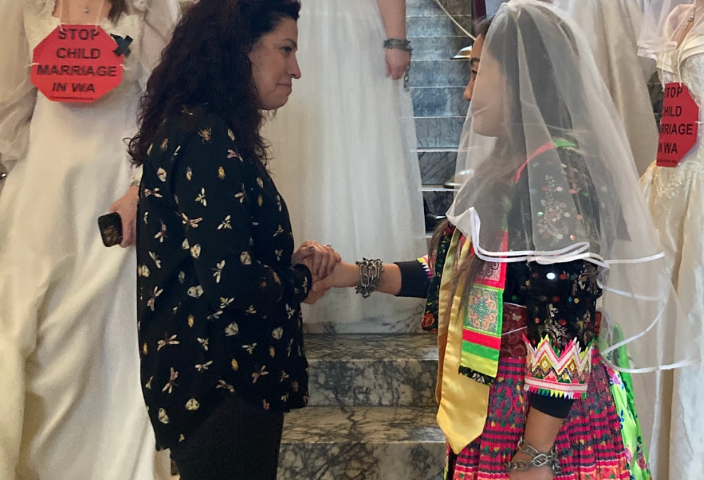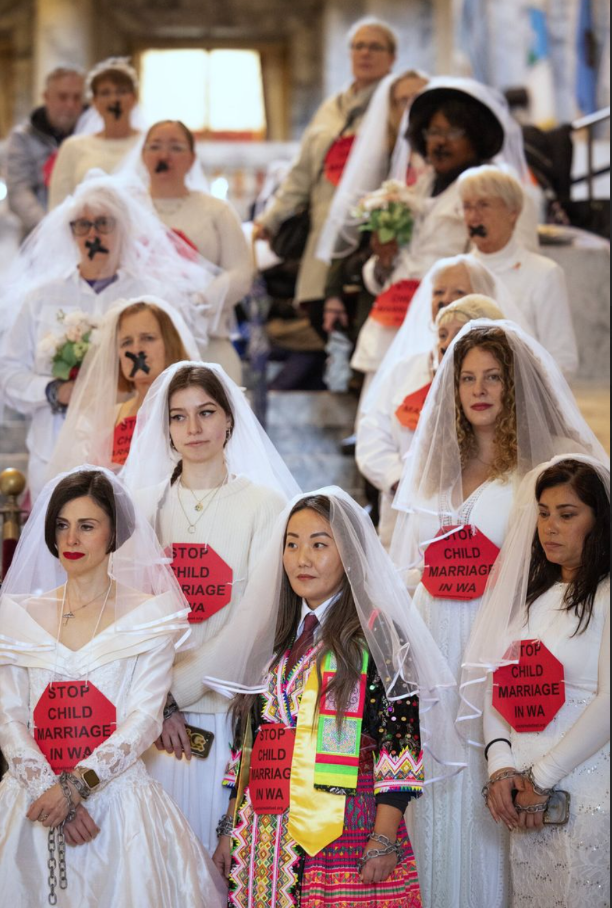Washington state survivor trapped in child marriage at age 12 now advocates for an end to this abuse

Kate meets with Washington state representative Monica Stonier, the child marriage House bill sponsor, at the Washington State Capitol Building advocacy event in January this year
Published on 3/6/2024. Updated on 3/7/2024 to include since publication the signing of the child marriage bill by Governor Jay Inslee.
Washington state survivor trapped in child marriage at age 12 now calls for an end to this abuse
Kate Yang shares her harrowing history of being sold into child marriage and slavery in Washington state by her parents at just 12 years old, and her courageous fight for freedom amidst unimaginable abuse. Kate navigated through a nightmare of servitude and violence, finding solace in education and ultimately breaking free to build a new life of advocacy and empowerment. Her journey of strength and resilience from child bride to survivor offers hope and inspiration for those facing similar struggles.
This is her story, as told to AHA Foundation.
Kate Yang was shocked when at 12 years old, her Hmong parents sold her for $6,000 into a child marriage in Washington state.
“My mother told me I had to live with our relatives and serve their family to pay off a debt because they had helped my mother. I was only given 24 hours notice to depart”.
However, she said child marriage was not unknown to her, even at 12.
“I have witnessed many children in forced child marriage in America’s Hmong community. But there was nothing I could have done to change the situation. At 12, I did not have the mental capacity to fight for myself, and my childhood home was very broken and filled with abuse.”
But as soon as she joined her 18-year-old husband’s family, a nightmare of slavery and assault began.
“I told my aunt I was being abused verbally, physically, and sexually. She said I couldn’t leave my marriage because I have been purchased and cannot be returned… That if I left, my entire family and the Hmong community would disown me.”

Kate (in the first row, center) with AHA’s Susanna McIntyre, Development Coordinator, and Michele Hanash, Director of Policy and Women’s Programs (second row, first and second from the left), and other advocates including Unchained At Last’s Fraidy Reiss and child marriage survivor Sara Tasneem, at the protest against child marriage at the Washington Capitol Building.
“My in-laws had 6 children and owned a large family flower business at Seattle’s Pike Place Market. At 12, while still at school, I was expected to be a wife, nanny, housekeeper, farmworker and florist.”
She was expected to wake by 5 am to prepare lunch for her mother-in-law before catching her school bus. After school she had to pick up and feed younger children, help with homework, prepare dinner, then pick flowers on the farm and load them into the trucks, and finally return home to clean the kitchen and house.
“This was my daily life for 11 years. My husband was very abusive from the start. When I did not want to be intimate with him, he would hit me, or punch the walls. My mother-in-law said it was my responsibility to make sure that my husband, his family, and the Hmong community was happy. I knew if I did not give in and serve them, I would suffer further.”
“My mother-in-law told me I must never speak to anyone outside the Hmong community about my marriage, or the police will put my mother in prison forever and my three younger sisters would be taken away.”
Despite these horrific circumstances, Kate somehow found the strength to look for a way out.
“Four months after my wedding, my husband brought me to visit my relatives whom I used to live with. This was the first time I was able to ask my family for help. I told my aunt I was being abused verbally, physically, and sexually. She said I couldn’t leave my marriage because I have been purchased and cannot be returned… That if I left, my entire family and the Hmong community would disown me. I would have to live on the streets, and no one would take me in. She said she would tell my husband to stop beating me, and this was all my family could do for me because they did not own me any more.”
“Sadly my aunt telling my husband to not beat me anymore led to more beatings from my husband. I realized my family was not going to help me and I had to endure my life as a child slave in America.”
“School was the only place I felt safe, the only place where I was not hurt or abused by adults. It became my safe haven where I could block out the abuse going on at home. I committed myself to the simple joy of helping others since I was unable to help my own situation. As I grew older I became the President of the Hmong Youth Group where I evolved as a leader. In mentoring youth for 2 years I have learned much about myself and my strengths. I felt the 12-year-old bride inside me asking for help and I knew that I was old enough and wise enough now to listen and see how I can help.”
“At age 22, I convinced my husband to allow me to study at the University of Washington. I had already been serving their entire family as a child slave for 10 years. I was not allowed to have any friends. Everyone in his family has either broken me or seen me broken to a point of no return. So everyone believed I would never find the courage to leave… that is the only reason I was allowed to attend university.”
Kate says that after years of abuse, education became the path to a new life for her and allowed her to have hope for the future.
“I had felt like I owned nothing in my life, not my body, not my mind, not even my soul. I realized that my education was the only thing my abusers were not able to take from me. My education allowed me to gain knowledge…and to have hope for an escape, a brighter future free from abuse.”
“I found my voice for the first time at the age of 23, after 11 years of abuse. I dialed 911 and escaped with my children. Leslie Ashbaugh, one of my university professors, played a critical role after my husband’s arrest, making sure I received the help I needed to make a complete escape from my marriage.”
Kate is now a proud business owner and free of the marriage—although still suffering the PTSD impact it caused, Kate has turned to advocating to help others out of child marriages.
“My experience, my perseverance has prepared me for this moment, to let all child marriage survivors know that I survived, they are not alone, and help is here. And to reassure them: When in doubt, invest into yourself. Knowledge is power, you can never go wrong with pursuing education.”
“I had felt like I owned nothing in my life, not my body, not my mind, not even my soul. I realized that my education was the only thing my abusers were not able to take from me. My education allowed me to gain knowledge…and to have hope for an escape, a brighter future free from abuse.”
As part of her advocacy, Kate recently participated in a protest at the Washington State Capital Building, attended by members of the Washington Coalition to End Child Marriage, including AHA Foundation, organized by Unchained At Last. Thanks to this advocacy effort, the Washington State Senate passed the child marriage bill on February 23, and the bill was signed into law by the Governor on March 7.
Kate attributes her ability to participate in this advocacy with the free mental health support she received. This support helped Kate work through her PTSD, as she says: “so I could be strong enough to share my story.”
“If I had not escaped my child marriage, I would not be alive today. My marriage was an unbearable prison filled with abuse.”
“Life is a challenge living with PTSD but I am blessed. I have my health, my children, my emotional support dog Winnie — and I just got engaged to my life partner Michael. I am excited for the next chapter of my life.”
Learn more about the devastating consequences of child marriage
Tamara’s story of surviving child marriage that began when she was 12.
With AHA Foundation’s help, Dolly escaped forced marriage in Egypt and claimed her freedom: “I can finally be my authentic self.”
Davinder Kaur, forced marriage survivor, on breaking free and exposing abuse against women: “We all have to play our part in ending these human rights abuses.”
A Survivor of Child Marriage in the U.S. On Her Ordeal and How She Won Her Freedom: “Being married to an older man was like being a prisoner. I didn’t even have control over my own body.”

